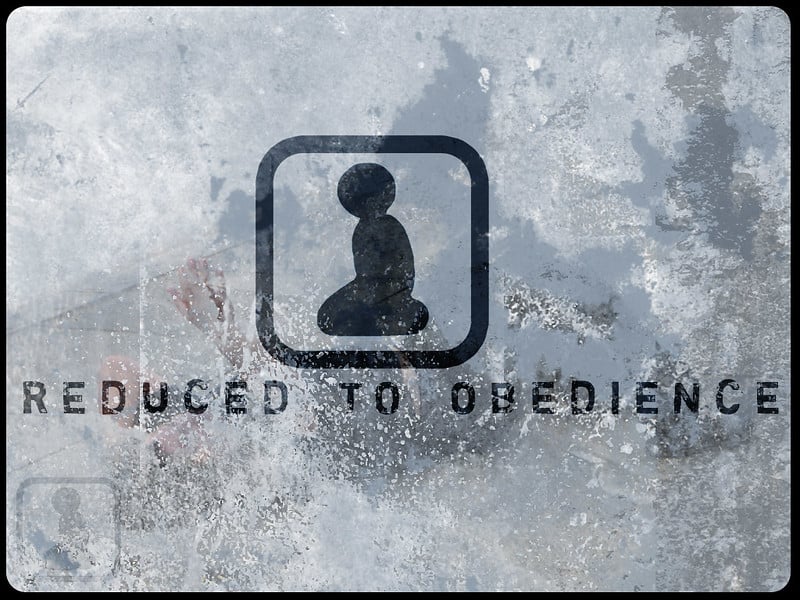What does true obedience to God look like—and what doesn’t it look like? This isn’t just a theoretical question. It goes to the heart of what it means to follow Christ.
Many of us know we’re supposed to obey God, but have we asked, “Why am I obeying? What drives my obedience?” Is it born from genuine faith, or is it a disguised form of legalism— an attempt to prove ourselves or earn God’s acceptance?

True obedience isn’t about external compliance or religious performance. It isn’t about checking spiritual boxes or keeping up appearances. Instead, real obedience flows from trust—a living faith that says, “Because I believe You are good, wise, and for me, I will follow You even when I don’t understand.”
But many of us slip into what I call “fobedience”— false obedience that looks right on the outside but is driven by fear, pride, or self-doubt. Let’s explore what that looks like, and how real faith motivates true obedience, even when we don’t feel like obeying.
False Obedience (“Fobedience”)
“Fobedience” is obedience in form, but unbelief in spirit. It’s when we obey to secure something for ourselves—whether peace of mind, approval from others, or God’s favor—as though our works could secure our standing before Him.
Yes, Christians are called to good works (Eph. 2:10). But there’s a world of difference between obeying because we trust God and obeying to prove ourselves. Fobedience obeys to earn love; real obedience obeys because of love.
Before we can understand what drives obedience when we don’t feel like it, we need to address three common ways people wrongly approach obedience:
-
To Prove to Myself
Some of us obey because we want to reassure ourselves that we’re “really” saved. We think, “If I can just do enough good, maybe I’ll know I’m right with God.”
But when obedience is about proving ourselves, it’s not about God at all—it’s about managing our anxiety. This path leads to endless striving and exhaustion, never real peace. True peace comes not from examining our works, but from trusting in what Christ has already done.
-
To Prove to Others
Sometimes, we obey to look good in front of others—to seem holy, mature, or devoted. But this is obedience driven by fear—fear of rejection or exposure. Jesus warned against this: “Beware of practicing your righteousness before other people to be seen by them” (Matt. 6:1). If our obedience is about keeping up appearances, we’re not loving God—we’re using Him to protect our image.
-
To Prove to God
Perhaps most dangerously, we obey as if to convince God to love us—as if our works could earn His acceptance. But this denies the gospel. Our acceptance with God is because of Christ, not because of us. Obedience that tries to “prove” something to God turns Him into a cosmic employer and our works into a résumé. True obedience comes from resting in who Christ is and what He has already done.
Delight or Duty?
Another confusion we face is whether obedience should flow from delight or duty. Some say obedience must be joyful to be real; others worry they’ll never obey if they wait to feel joy.
Scripture offers a balanced view: Ideally, obedience grows into delight. But often, it begins with duty. In a fallen world, our desires are disordered. If we wait until we feel like obeying, we’ll rarely obey—especially when God’s commands require sacrifice.
Think of Jesus in Gethsemane. He didn’t “delight” in going to the cross. He obeyed because He trusted the Father (Matt. 26:39). Abraham didn’t feel joy in preparing to sacrifice Isaac, but he trusted God enough to obey.
Over time, as we obey, God reshapes our hearts. What feels like duty now may grow into delight later, as we see God’s wisdom and love more clearly.
How Faith Actually Motivates Obedience
So what makes real obedience different from legalistic compliance? Outwardly, both may look the same. But the difference lies in the heart, in the relationship that drives obedience.
True obedience flows from trust in God—from faith that says, “You are wise and good, and I’ll follow You even when I don’t understand.” It’s not about proving how much we can suffer or how strictly we can keep rules. It’s about trusting God’s character.
If we wait until we want to sacrifice our time, energy, or desires, we’ll never start. Obedience isn’t about waiting for perfect feelings. It’s about trusting God’s wisdom over our own.
Obedience isn’t “legalistic” when motivated by two things:
- A desire to honor God because of who He is.
- A longing to become like Christ, who obeyed the Father even unto death.
In fact, obedience born from duty can still delight God, because it shows that our love for Him outweighs our own desires. If we only obey when we want to, are we really submitting to God—or just to ourselves?
Consider Abraham. Everything in him must have recoiled from the command to sacrifice Isaac, yet he obeyed because he trusted God. If Abraham could obey such a terrible command, surely we can trust God enough to obey even when His commands feel costly or confusing. Godly obedience often feels difficult, even arbitrary, at first. But God sees what we cannot. Sometimes, it’s only after a long season of obedience that we recognize the wisdom of God’s ways.
If we wait until obedience feels good or makes sense, we’ll stay stuck. But if we believe Jesus is King— if we trust His love and authority— that is reason enough to obey. Faith doesn’t focus on the commands themselves but on the God who gives them. Faith says, “I don’t need to know why, because I know Who.”
Like a child trusting a parent, faith obeys even when it doesn’t understand. And faith looks beyond present sacrifice to future reward. Like Moses, who “considered the reproach of Christ greater wealth than the treasures of Egypt” (Heb. 11:26), faith sees that God’s promises are better and lasting.
If you’re struggling to obey in some area, don’t wait for perfect motivation or feelings. Obey because you trust that Jesus knows what you do not. And as you walk with Him, what felt like a burden may become a joy—not because it’s easy, but because you’ve come to know Him better.
Faith Acts
Hebrews 11 is often called the “hall of faith,” but it could just as easily be called the “hall of obedience.” Each person listed acted because they trusted God. Abel offered. Noah built. Abraham went. Moses refused Egypt’s treasures. Rahab welcomed the spies. Here’s a question worth asking: If Hebrews 11 were still being written today, what works of faith—what costly acts of obedience—would be written next to my name?
At the end of the day, faith justifies not because it is a work, but because it magnifies Christ. And real faith will always produce works. Not every good deed comes from faith—people do good things for all kinds of reasons—but only the works that flow from trusting God are acts of true obedience.
And yes, love that comes from faith is not perfect. It stumbles and wavers. But it tries. Like Roosevelt’s “man in the arena,” real faith gets into the fight. It may not always win, but it steps into the struggle because God is worth it.
So instead of asking, “Is my obedience perfect?” ask, “Is my obedience growing out of faith?” Am I trusting God enough to obey, even when it’s hard? The obedience that God delights in says: “I trust You, even when I don’t see.”












